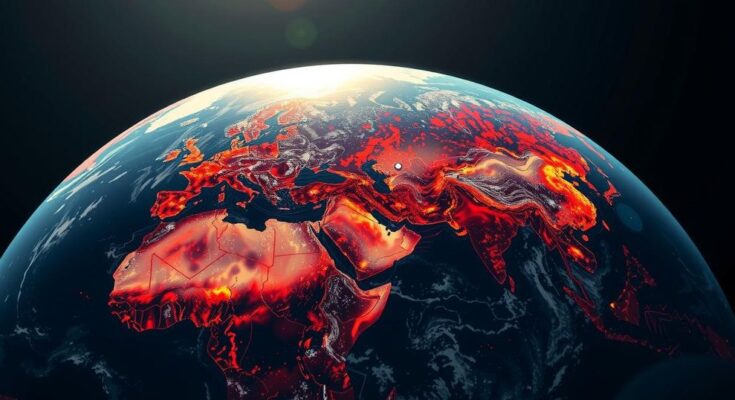The UN report warns that global temperatures may rise by 3.1°C by 2100 without immediate and significant reductions in greenhouse gas emissions. Nations must collectively commit to substantial emissions cuts, or face severe climate consequences. The forthcoming COP29 is critical for nations to update their climate action plans in line with the Paris Agreement’s goals.
A recent report by the United Nations predicts an alarming average global temperature rise of 3.1°C by the end of the century if substantial reductions in greenhouse gas emissions are not achieved immediately. Despite the ambitious 1.5°C target established during the 2015 Paris Agreement, nations have largely failed to implement necessary changes, opting instead to pursue military developments and fossil fuel extraction. This has resulted in severe environmental consequences, illustrated by extreme weather events such as flooding in the Sahara Desert, rising sea levels in the Florida Keys, and frequent powerful hurricanes globally. The UN’s Emissions Gap Report released on October 24, 2024, emphasizes that without extraordinary global efforts to revise nationally determined contributions (NDCs) aimed at mitigating climate change, the 1.5°C goal could soon become unattainable. The report outlines the need for countries to collectively reduce greenhouse gas emissions by 42% by 2030 and 57% by 2035 in order to align with the goals of the Paris Agreement. UN Secretary-General António Guterres expressed pressing urgency, stating that the current emissions trajectory is unsustainable and poses a direct threat to vulnerable populations worldwide. The upcoming COP29 UN Climate Change Conference is deemed crucial for nations to present ambitious new action plans toward mitigating climate change effects. The report suggests utilizing current affordable technologies could mitigate emissions significantly if underscored by ambitious political will. Despite possessing the means to potentially reduce emissions by up to 31 gigatons of CO₂ by 2030 through enhancements in renewable energy, forest conservation, and improved efficiency, unprecedented international cooperation is deemed essential to achieving these objectives. The lack of recent progress in reducing emissions despite prior commitments points to the challenges faced in addressing climate change adequately.
The UN’s Emission Gap Report serves as a critical assessment of the disparity between current global greenhouse gas emissions and what is required to meet international climate goals. Established during the Paris Agreement in 2015, the 1.5°C target serves as a benchmark for countries to strive toward in reducing emissions and mitigating climate change impacts. However, the report indicates that progress has stagnated, necessitating urgent and collective action from nations worldwide to avoid potential climatic crises.
In conclusion, the UN’s report underscores the urgent need for collective international action to reduce greenhouse gas emissions significantly. The failure of nations to implement needed reforms threatens the viability of the Paris Agreement’s climate targets. The coming months leading to COP29 will be pivotal as global leaders must present robust plans to steer global temperatures away from catastrophic increases, ensuring the survival of the planet for future generations.
Original Source: cleantechnica.com




